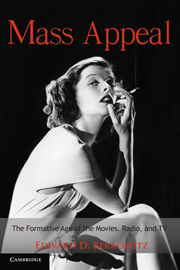Book contents
- Frontmatter
- Contents
- Acknowledgments
- Introduction
- 1 Sound Comes In, Vaudeville and Silent Pictures Go Out
- 2 From Broadway to Hollywood with Groucho, Fred, and Ginger
- 3 Radio Nights
- 4 From the Thirties to the Forties with Kate, Bud, and Lou
- 5 Bogie, Bob, and the Boys at War
- 6 The Postwar Movie Scene
- 7 Make Room for TV
- 8 Putting It Together: Walt Disney Introduces the Baby Boom to Television
- 9 The End of an Era?
- Notes
- Movie, Radio, and TV Listings
- Index
2 - From Broadway to Hollywood with Groucho, Fred, and Ginger
Published online by Cambridge University Press: 05 June 2012
- Frontmatter
- Contents
- Acknowledgments
- Introduction
- 1 Sound Comes In, Vaudeville and Silent Pictures Go Out
- 2 From Broadway to Hollywood with Groucho, Fred, and Ginger
- 3 Radio Nights
- 4 From the Thirties to the Forties with Kate, Bud, and Lou
- 5 Bogie, Bob, and the Boys at War
- 6 The Postwar Movie Scene
- 7 Make Room for TV
- 8 Putting It Together: Walt Disney Introduces the Baby Boom to Television
- 9 The End of an Era?
- Notes
- Movie, Radio, and TV Listings
- Index
Summary
Coming so close to the advent of sound, the movies of the 1930s provided an opportunity for a new group of stars to make their way from Broadway to Hollywood. Comedians who embodied the wit of the 1920s and dancing stars who conveyed the glamour of Broadway stepped in front of the sound cameras and became big stars in the first half of the 1930s. The career of comedian Groucho Marx, which encompassed vaudeville, Broadway, the movies, television, and radio, showed one such pathway, as did that of Fred Astaire and his dancing partner Ginger Rogers.
The Movies and the Depression
The movie industry, like all American industries, suffered during the Depression, but ultimately proved quite resilient. The innovation of sound helped to protect Hollywood against the initial and long-term ravages of the economic downturn. Profits peaked not in 1929, the last boom year, but in 1930, a Depression year, in which the largest eight movie companies made a combined profit of more than $55 million. Movies, like candy, were a cheap item that delivered a great deal of satisfaction, an affordable indulgence in hard times. Still, as the Depression spread to more areas of the country and more sectors of the economy, it put the squeeze on people’s pocketbooks in ways that affected the movies. Someone in the habit of going to the movies twice a week might save money by only going once a week. As a result, film attendance dropped by 41 percent in 1931. The next year proved even worse, with the industry sustaining net losses. Highly paid Hollywood personnel took salary cuts. As a result of the financial disruption caused by the expansion into sound and the contraction caused by the Depression, big studios such as Paramount, Fox, and RKO went into bankruptcy or receivership.
- Type
- Chapter
- Information
- Mass AppealThe Formative Age of the Movies, Radio, and TV, pp. 20 - 38Publisher: Cambridge University PressPrint publication year: 2010



